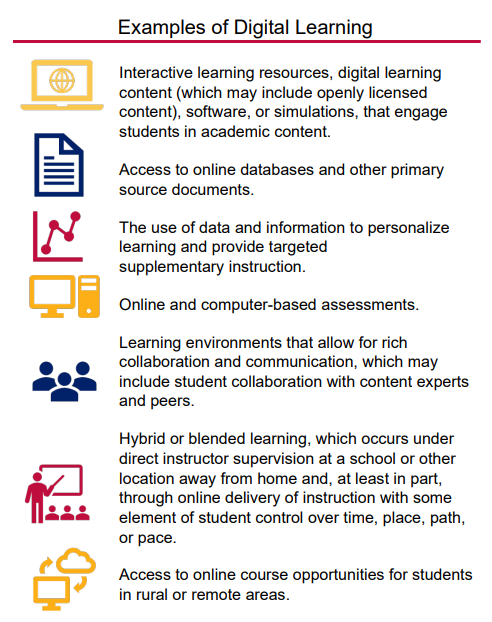Welcome to Digital Learning
PURPOSE
ADE Digital Learning provides leadership, service, and support to educators and administrators to improve the effective use of technology and increase digital learning opportunities to improve the academic achievement and digital literacy of all students.
“Digital Learning is any instructional practice that effectively uses technology to strengthen a student’s learning experience and encompasses a wide spectrum of tools and practices” - ESSA 4102(1)(A)
Digital Learning is an integral component of a 21st Century Education, for both students and educators. Digital Learning and the development of Digital Literacy skills helps students engage in critical thinking, collaboration, communication, and creative problem solving across all disciplines and subject areas. Digital Learning can include:
- interactive learning resources, digital learning content (which may include openly licensed content), software, or simulations, that engage students in academic content;
- access to online databases and other primary source documents;
- the use of data and information to personalize learning and provide targeted supplementary instruction;
- online and computer-based assessments;
- learning environments that allow for rich collaboration and communication, which may include student collaboration with content experts and peers;
- hybrid or blended learning, which occurs under direct instructor supervision at a school or other location away from home and, at least in part, through online delivery of instruction with some element of student control over time, place, path, or pace; and
- access to online course opportunities for students in rural or remote areas.
The role of the Digital Learning Specialist is to serve as resource to Arizona educators and the Arizona Department of Education to “increase access to personalized, rigorous learning experiences supported by technology.” (ESSA 4104(b)(3)(C)) The specific duties of the Digital Learning Specialist include, but are not limited to:
- Providing educators with the knowledge and skills to use technology effectively, including the effective integration of technology, to improve instruction and student achievement.
- Providing technical assistance to LEAs to identify and address readiness shortfalls, use technology to support the learning needs of all students, and build capacity for school leaders to support teachers in using data and technology to improve instruction and personalize learning.
- Support schools in rural and remote areas to expand access to high-quality digital learning opportunities.
- Developing or using strategies that are innovative or evidence-based for the delivery of specialized or rigorous academic courses and curricula through the use of technology.
- Disseminating promising practices related to technology instruction, data security, and the acquisition of and implementation of technology tools and applications.
- Making instructional content widely available through open educational resources.








